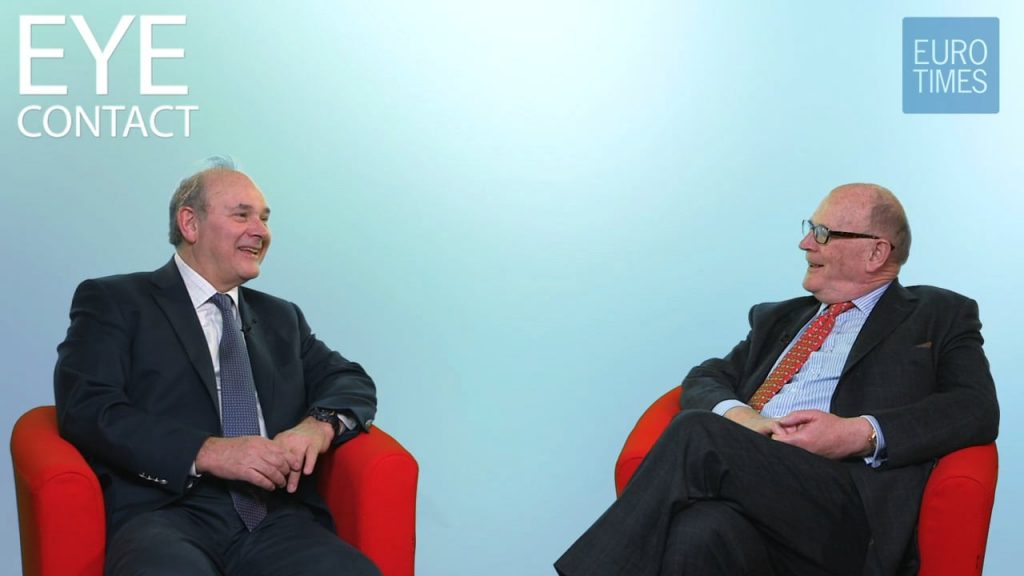Innovation today
Truly original changes need a particular kind of environment

Aidan Hanratty
Published: Wednesday, October 2, 2019
 Does regulation result in decreased levels of innovation? Looking at the history of ophthalmology, one has to wonder if the advances made by the greats such as Harold Ridley and Charles Kelman would have been possible if the arms of medical ethics and safety were as prevalent as they are today.
“Things were different in those days,” said Prof David Spalton in a EuroTimes Eye Contact interview with Paul Rosen MD. “These days, with ethics and regulation – I think there’s always room for someone with a brilliant new idea to do things differently, but I don’t think anyone could do it in the same way that they did, which was really without any ethics, consent or that sort of thing.
“It’s a good thing now, things are better regulated and that must be in the patient’s interest.”
Harold Ridley, who first saw the possibilities of intraocular lenses and indeed brought them to reality, performed his first operations in secret, such a revolutionary procedure it was at the time.
It’s important to remember that while the reward was truly great, for many millions of patients, there was also substantial risk in his novel idea. “Had Harold Ridley’s first operation gone wrong, we might not be here,” said Prof Spalton.
Indeed, the materials used to sterilise early PMMA lenses leached into the eye, causing anterior uveitis, to give just one example of something that could ideally be prevented by regulation. “Times were different back then – surgeons had an idea and they could try it out and experiment,” adds Prof Spalton.
Charles Kelman, a showman by nature as well as being a pioneering ophthalmologist, took the opposite approach, going on television talk shows to expound about the possibilities of his approach, which he famously arrived at after many failed attempts over a course of nearly three years searching for a method of cataract removal that would require no hospitalisation.
It almost goes without saying that phacoemulsification is now the norm, and advances like femtosecond laser-assisted surgery have been shown only to be as good as phaco.
It’s unclear what the next major change in ophthalmology will be, but artificial intelligence is sure to play a part, Prof Spalton believes. “Automation, robotic surgery is coming in, and we’re going to see that taking an increasing role.”
He also suggests that eye trackers could be combined with femto lasers for lens removal. Maybe not just yet, but the rate of progress to date has been such that nothing can be ruled out.
Whether such things will be helpful in creating a truly accommodative lens, the next hurdle for ophthalmology according to Prof Spalton, remains to be seen. The only change we can be certain of, is change.
Life Behind The Lens – David Spalton (Athens 2019)
Does regulation result in decreased levels of innovation? Looking at the history of ophthalmology, one has to wonder if the advances made by the greats such as Harold Ridley and Charles Kelman would have been possible if the arms of medical ethics and safety were as prevalent as they are today.
“Things were different in those days,” said Prof David Spalton in a EuroTimes Eye Contact interview with Paul Rosen MD. “These days, with ethics and regulation – I think there’s always room for someone with a brilliant new idea to do things differently, but I don’t think anyone could do it in the same way that they did, which was really without any ethics, consent or that sort of thing.
“It’s a good thing now, things are better regulated and that must be in the patient’s interest.”
Harold Ridley, who first saw the possibilities of intraocular lenses and indeed brought them to reality, performed his first operations in secret, such a revolutionary procedure it was at the time.
It’s important to remember that while the reward was truly great, for many millions of patients, there was also substantial risk in his novel idea. “Had Harold Ridley’s first operation gone wrong, we might not be here,” said Prof Spalton.
Indeed, the materials used to sterilise early PMMA lenses leached into the eye, causing anterior uveitis, to give just one example of something that could ideally be prevented by regulation. “Times were different back then – surgeons had an idea and they could try it out and experiment,” adds Prof Spalton.
Charles Kelman, a showman by nature as well as being a pioneering ophthalmologist, took the opposite approach, going on television talk shows to expound about the possibilities of his approach, which he famously arrived at after many failed attempts over a course of nearly three years searching for a method of cataract removal that would require no hospitalisation.
It almost goes without saying that phacoemulsification is now the norm, and advances like femtosecond laser-assisted surgery have been shown only to be as good as phaco.
It’s unclear what the next major change in ophthalmology will be, but artificial intelligence is sure to play a part, Prof Spalton believes. “Automation, robotic surgery is coming in, and we’re going to see that taking an increasing role.”
He also suggests that eye trackers could be combined with femto lasers for lens removal. Maybe not just yet, but the rate of progress to date has been such that nothing can be ruled out.
Whether such things will be helpful in creating a truly accommodative lens, the next hurdle for ophthalmology according to Prof Spalton, remains to be seen. The only change we can be certain of, is change.
Life Behind The Lens – David Spalton (Athens 2019)